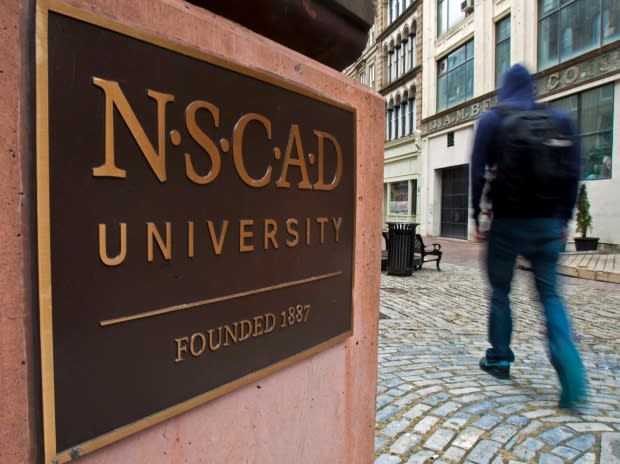NSCAD faculty union set to strike early Friday
Members of the faculty union at NSCAD University are preparing to hit the picket line on Friday morning.
The 95 full-time and part-time faculty members at the Halifax art and design school are set to strike as of 8:30 a.m., according to an update on the union's website.
The union, FUNSCAD, says the key issues are workload, compensation and job security.
The collective agreement expired at the end of June 2018, and negotiations have continued since July.
In January, union members voted 97.5 per cent in favour of a strike mandate, with 97.6 per cent of members casting a ballot in the strike vote.
No one from the union responded to requests for comment on Thursday.

University president Dianne Taylor-Gearing said she could not comment on negotiations or what has led to the impasse, but said she's "very disappointed" that a strike is imminent.
"We believe it is a fair deal on the table and many of the proposals have been addressed, but the union's deciding that it's going to take this action," she said.
Taylor-Gearing said the university's financial position has improved in recent years, with a balanced budget in each of the last three years as well as increased enrolment and diminishing debt. She acknowledged that everyone at the university — including faculty — has helped make those strides.
"I know the faculty are making a point of their sacrifice. We've all worked to the benefit of the institution because we believe in it passionately," she said. "However it still comes back to if you cannot afford a demand by the union, it just simply isn't affordable."
Impact on students
Kassidy Bernard, the president of the student union, SUNSCAD, said her group plans to join striking faculty on the picket line to show support.
"We know that good working conditions for them means that we'll be receiving a better learning environment," said Bernard. "We know that our faculty are excellent at what they do. They are really passionate and they love their practice as well as teaching students. They make NSCAD great."
The student union is encouraging students not to cross the picket line. But Bernard said the group understands that may not always be possible.
Taylor-Gearing said about nine per cent of classes are taught by instructors who aren't in the striking bargaining unit, and those classes will continue. Students will not be penalized if they choose not to go to class, she said.
The university is prepared to extend the school year by as many days or weeks as the strike lasts, Taylor-Gearing said.
That could pose a problem for students who have leases that can't be extended, flights that are already booked, or who have jobs lined up or are about to graduate.
But Bernard said those issues won't affect student support.
"We're prepared to support them throughout the strike, whatever that duration is," she said.
What are some of the issues?
Wages: The union is seeking "modest" salary increases to keep up with the cost of living and bring salaries in line with other universities in the province. It says faculty have seen minimal wage increases over the past seven years.
Workload: The union says NSCAD is the last university in the province where faculty teach six courses a year, and it would like to see that number drop to a level comparable with other schools.
Job security: The union is hoping for longer contracts for part-time faculty, who currently don't know from one semester to the next which classes they will be teaching, or if they will be teaching at all.
Other: The union wants guaranteed research days for librarians, protections for family members who take time off to be caregivers, maintenance of the minimum number of full-time faculty and contract language about hiring faculty in Indigenous studies.
MORE TOP STORIES:

